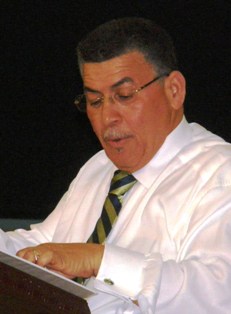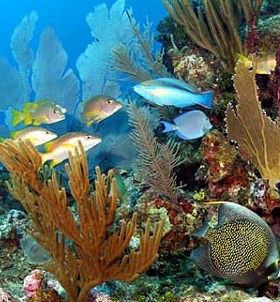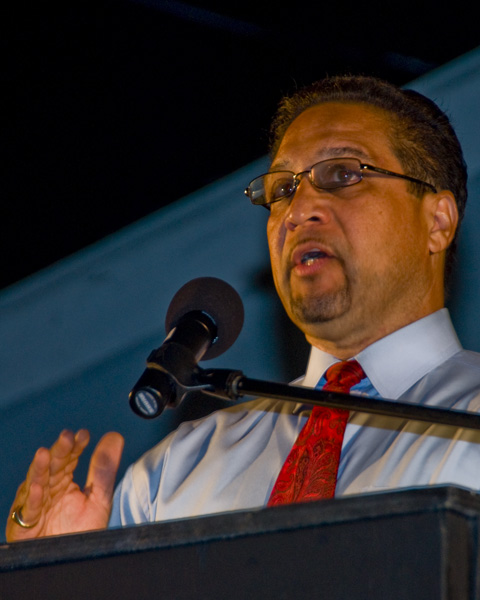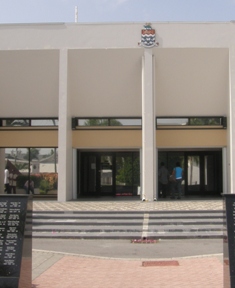 Headline News
Headline News

Cops recover shotgun in West Bay raid
 (CNS): Police have arrested a 22-year-old man following a firearms operation in the West Bay area late yesterday afternoon, when a loaded shotgun, several rounds of ammunition and a quantity of Ganja was recovered. At about 4.00 pm on Wednesday, 27 October, officers from, the armed unit, HM Customs, K9, CID and uniform staff from West Bay raided a house and a car in Northwest Point Road. District Commander for West Bay, ACI Frank Owens, said, “This operation underlines our commitment to act swiftly and decisively to remove guns and ammunition from the streets of the Cayman Islands.” (Photo Dennie Warren Jr)
(CNS): Police have arrested a 22-year-old man following a firearms operation in the West Bay area late yesterday afternoon, when a loaded shotgun, several rounds of ammunition and a quantity of Ganja was recovered. At about 4.00 pm on Wednesday, 27 October, officers from, the armed unit, HM Customs, K9, CID and uniform staff from West Bay raided a house and a car in Northwest Point Road. District Commander for West Bay, ACI Frank Owens, said, “This operation underlines our commitment to act swiftly and decisively to remove guns and ammunition from the streets of the Cayman Islands.” (Photo Dennie Warren Jr)
The 22-year-old man who has been arrested on suspicion of possession of an unlicensed firearm and possession of ganja remains in police custody while enquiries continue.
(Photo of recovered weapon supplied by RCIPS)
Anyone with any information about gun crime, or the whereabouts of illegal firearm, should
contact their local police station or the confidential Crime Stoppers number 800-8477 (TIPS)
Attached – picture of the recovered weapon

Robbers attack with machetes
 (CNS): A resident was attacked by two masked robbers armed with machetes early this morning as he was entering his home. George Town detectives are now investigating the robbery, which took place in Mahogany Way around 12.40 am Thursday. As he entered his house, the victim was suddenly confronted by the men, one of whom pushed him to the ground, demanded cash and struck him with a machete. Both men then forced their way into their victim’s home before making off with a quantity of cash and jewellery. Despite the attack, police said the victim did not require any medical attention following the incident.
(CNS): A resident was attacked by two masked robbers armed with machetes early this morning as he was entering his home. George Town detectives are now investigating the robbery, which took place in Mahogany Way around 12.40 am Thursday. As he entered his house, the victim was suddenly confronted by the men, one of whom pushed him to the ground, demanded cash and struck him with a machete. Both men then forced their way into their victim’s home before making off with a quantity of cash and jewellery. Despite the attack, police said the victim did not require any medical attention following the incident.
The first of the suspects is described as 5’8” in height, dark complexion, medium build, wearing a white cloth over his face carrying and had a Caymanian accent. The second is 6’ in height, slim build with a mask over his face. He was wearing dark jeans and a light coloured shirt and spoke with a Jamaican accent. Both of the robbers were armed with machetes, the police said.
Anyone who has any information about this crime, or who was in Mahogany Way at the relevant
time and saw anything suspicious, is asked to call George Town police station on 949-4222, or
the confidential Crime Stoppers number 800-8477(TIPS).

Mac defends loan decision
 (CNS): The premier has defended his decision to reject recommendations from the Central Tenders Committee over the funding of government’s CI$155 million loan, stating that he did so in the best interests of the country. In a television address on Wednesday evening Premier McKeeva Bush said that the financing deal government had secured with the New York based Cohen and Company would save the country millions and millions of dollars. Justifying why the CTC recommendation had not been accepted, he said that the concept of negotiating for a better deal does not exist within the current central tendering process and he was not satisfied that a joint bid from two local banks offered the best deal.
(CNS): The premier has defended his decision to reject recommendations from the Central Tenders Committee over the funding of government’s CI$155 million loan, stating that he did so in the best interests of the country. In a television address on Wednesday evening Premier McKeeva Bush said that the financing deal government had secured with the New York based Cohen and Company would save the country millions and millions of dollars. Justifying why the CTC recommendation had not been accepted, he said that the concept of negotiating for a better deal does not exist within the current central tendering process and he was not satisfied that a joint bid from two local banks offered the best deal.
As a result Bush revealed that he had spoken with Cohen and Company directly when he was in New York attending the UN conference last month and asked them to submit a proposal to the Treasury, which also included financing for Cayman Airways as well as a competitive interest rate.
“I received copies of an amended proposal from Cohen and Company in mid-October. This proposal provided an innovative solution that enables government to limit its interest rate. So this proposal allows government to benefit from the current low interest rates while guaranteeing that the interest rate will never go above the agreed fixed rate,” Bush told the people in his address on Wednesday evening. “This saves the Cayman Islands Government tens of millions of dollars,” he said, adding that it was not yet possible to give an exact figure until the long term financing facility is finalised. He said, however, that over the remainder of the current fiscal year government would save many more millions of dollars with this proposal than it would have with the Central Tenders Committee’s recommended tender.
“As minister of finance my duty and that of my government is to make sure that we are managing government’s finances in such a way that we are not creating tremendous hardship on our own people and not recklessly mortgaging the future of generations to come,” the premier stated. “It is my considered view that CNS and Rooster FM have maliciously criticised the government. The Opposition have been jumping to conclusions, as well. However, their mismanagement of government funds is one of the reasons why we have to borrow so much now.”
He also pondered why the opposition could not figure out that there was good enough reason in the bad financial times for government to try and save money. But he also pointed to the New York firm’s ability to provide the funding for Cayman Airways and refinancing needs surrounding its debt and “related to the historical shareholder deficiency”, which, he said, would allow the airline to function more effectively as a strategic driver of tourism growth and economic development.
“I did not take overriding the selection of the Central Tenders Committee lightly,” Bush revealed. “As finance minister and premier I was duty bound to get the best terms possible on this funding … I had to decide whether to choose substance or to choose process.”
He added that he believed the best interests of the Cayman Islands were served by overriding the selection of the Central Tenders Committee. “I did not do this without taking advice as to my authority to do so,” the premier added, stating that he was confident that he had acted in the best interests of these Islands in selecting Cohen and Company. He also said that the entire transaction has been above board and no member of the United Democratic Party has any financial interest in Cohen and Company whatsoever.
The premier went on to say that the tendering process needs to be revamped and he had already asked for the auditor general’s assistance in making recommendations for changes to the tendering process that “will result in a more efficient, modern and sensible process,” he stated.

DoE to grow marine parks
 (CNS): A new research project has been launched by the Department of Environment with the goal of increasing the amount of Cayman’s marine habitat under official protection. With only 17% of the islands’ shelf currently designated as marine parks and given the increasing global as well as local pressure on the delicate reef systems, the department says it would like to set aside 30% of the surrounding marine environment for protection. It is more than twenty-five years since Cayman led the way by setting aside marine habitat in specially zoned parks, which have proved invaluable. However, with climate change and a growing population there is now a pressing need to enhance those parks.
(CNS): A new research project has been launched by the Department of Environment with the goal of increasing the amount of Cayman’s marine habitat under official protection. With only 17% of the islands’ shelf currently designated as marine parks and given the increasing global as well as local pressure on the delicate reef systems, the department says it would like to set aside 30% of the surrounding marine environment for protection. It is more than twenty-five years since Cayman led the way by setting aside marine habitat in specially zoned parks, which have proved invaluable. However, with climate change and a growing population there is now a pressing need to enhance those parks.
The three year project to assess the condition and challenges faced by the Cayman Islands’ marine environment is being partially funded by the UK’s Darwin Initiative and supported in kind with resources, manpower and expertise from the US Nature Conservancy and the School of Ocean Sciences at Bangor University in Wales, as well as the DoE. The goal is to gather further scientific data about the local marine environment, beaches and mangrove areas to see what impact coral bleaching, rising acidity, fishing levels and other factors have had on the islands’ oceans.
Speaking at a special launch of the project on Wednesday morning, the director of the Department of Environment, Gina Ebanks-Petrie, explained that the project would help the DoE make the case for enhancing the parks and protecting a greater percentage of marine habitats.
She said that when the marine parks were first designated, many of the modern threats facing reefs and other marine habitats that exist today were not even a consideration. When the parks were designated they were done mostly to protect the reefs from divers and anchor damage, as well as some over fishing, but today there are far more pressing and aggressive threats to the wider marine environment.
“We hope to increase the total protected area to 30% and we believe we can get the message out to demonstrate that this is the very least we will need in order to protect the marine environment in future,” the DoE Director said.
Joined by Dr John Turner from the School of Ocean Sciences and James Byrne from Nature Conservancy at the launch of the campaign, Ebanks-Petrie said that the data they would collect during the project added to the knowledge, information and experience of managing the existing parks that the DOE already had, would be used to make the a proper scientific case for enhancing the parks and she hoped it would be broadly supported by the public. She also added that the findings would be presented during the project period at public consultation meetings.
Dr Turner explained that designating protected areas was not just about immediate conservation but about making reef systems resilient enough to recover from damaging impacts and environmental hazards such as bleaching events or storms.
“We must ensure that marine ecosystems such as coral reefs maintain their capacity to recover from major impacts,” he said. “If these systems lack resilience, then economic losses incur as property and critical infrastructure become insecure, fish catches reduce, other species and habitats such as turtles, seabirds, sea grasses and mangroves decline, and tourism revenue is lost.”
Byrne emphasised the point that the reefs here still had considerable diversity and there were small pockets of recovery of some species of coral and fish which had virtually disappeared in other parts of the Caribbean. The aim of protection was to give the reefs a better chance at future recovery and sustainability. He also noted that as protected areas grew in diversity and species, those fishes and other corals would spread to a wider area, enhancing the marine system outside of protected areas as well. “This is about a wider more sustained recovery and not just about preserving the last remaining reef or marine habitat,”he said.
Ebanks-Petrie pointed out that the goal was be to have the enhanced marine parks protected under the new National Conservation Law, which she said she now believed would be going before the Legislative Assembly early next year. “We need the law passed so that we will be able to manage and protect the enhanced areas and make the marine parks effective,” she added.
Cayman had once led the way in marine conservation, the experts pointed out, and said that it could do so again with this project.
East End port plans official
(CNS): Recent speculation that property developer Joseph Imparato was planning to build a commercial port in the district of East End was confirmed on Wednesday morning when he revealed that a proposal had been submitted to the Cayman Islands Government for consideration. In a press release Imparato said the ‘East End Seaport’ would be a maritime infrastructure project facilitating five different types of marine based commercial activities, as well as a selection of complementary land based activities. These include a commercial cargo port, hydrocarbon storage facility, cruise ship home port, transhipment of containerised cargo and a luxury mega yacht marina.
The concept of creating a commercial port in the East End, High Rock area has raised considerable controversy across Grand Cayman as well as in the district itself, in particular from the local MLA Arden McLean. However, Imparato has said he will be holding a series of public meetings in the coming weeks, allowing the people of the Cayman Islands to take a closer look and learn the facts about the proposed East End Seaport.
Addressing some of what he said were the misconceptions circulating in the community, the property developer said in the release that the seaport would be developed on privately owned land and would be privately funded, but the port facilities would be managed by the Port Authority of the Cayman Islands, not a private entity. Imparato also stressed that there would be no oil refinery.
He said that an appropriate Environmental Impact Assessment would be conducted, the results of which will inform the design, engineering and construction methodology of the seaport.
In advance of the community presentations, a web site will be launched that will provide information on the proposed seaport, the release revealed. “Once it is launched, the site will provide a central location for information about the project, from project specifications to the proposed timeline,” the release said.
Imparato said that work had begun clearing paths on the property to allow access for preliminary site works prior to the commencement of the environmental impact assessment.
“The East End Seaport is an infrastructure project that allows for genuine economic diversification and expanded socio-economic benefits of this new project for decades to come,” Imparato’s release stated, adding that he was committed to making the facts available to the public and was encouraging the people of the Cayman Islands to take a closer look at the proposed East End Seaport.
Vote in the CNS poll: Are you in favour of the Est End Seaport?
Ministry denies further delays over school projects
(CNS): Despite the fact that there appears to be no work going on at either of the construction sites for the government’s two new high schools and the remaining subcontractor has left the job, the Education Ministry denied that the projects were subject to any further delays on Wednesday. Re-confirming that Caribbean Mechanical (High Schools 2008) Limited (CMHSL) were leaving the work sites, the ministry claimed that the relationship between the Cayman Islands Government (CIG) and the sub-contractor had always been an interim one. In a second statement in a week on the school projects, the ministry again stated that the new construction management team was expected to mobilise shortly.
The ministry said the departure of subcontractor CMHSL was part of the anticipated transition process of both projects by the new construction management team.
"The Cayman Islands Government (CIG) and Caribbean Mechanical (High Schools 2008) Limited (CMHSL) have mutually agreed to terminate their interim relationship, which was forged in the immediate aftermath of the general contractor’s departure," the ministry stated. ‘It is anticipated that the new construction management team will shortly mobilise. Work at the project sites will increase to full capacity under their supervision."
Following the departure of Tom Jones International from the school projects in October 2009 as a result of s dispute between it and government, CMHSL, a sub contractor which has been one of the leading work groups on the site since its inception, returned to the sites at the beginning of 2010 to maintain the integrity of the work already done.
At that time government explained it had assumed responsibility for the CMHSL contracts to ensure the continuation of certain work at the project sites, pending the appointment of a new construction management team.
"Both parties anticipated that this interim arrangement would be terminated at an appropriate time, and this is exactly what the parties have now agreed to do," the ministry said in the official statement.

Law Reform Commission says don’t limit claims
 (CNS): Following a request by the minister of health to reform the country’s tort laws to put caps on personal injury awards and to limit the time period in which they can be made, the Law Reform Commission (LRC) has recommended against it. Opening the review of the law for public debate and consultation, the LRC has published its findings and recommendations and is now seeking comment. The pressure for reform has come as a result of escalating fees for doctors’ insurance cover because of a number of high awards. However, in its provisional recommendations the LRC has warned that capping claims does not necessarily remove the problem of increasing premiums but can undermine access to justice for those who have suffered because of medical malpractice.
(CNS): Following a request by the minister of health to reform the country’s tort laws to put caps on personal injury awards and to limit the time period in which they can be made, the Law Reform Commission (LRC) has recommended against it. Opening the review of the law for public debate and consultation, the LRC has published its findings and recommendations and is now seeking comment. The pressure for reform has come as a result of escalating fees for doctors’ insurance cover because of a number of high awards. However, in its provisional recommendations the LRC has warned that capping claims does not necessarily remove the problem of increasing premiums but can undermine access to justice for those who have suffered because of medical malpractice.
The LRC has instead proposed introducing a standard of care in medical negligence; establishing an expert witness rule and introducing alternative dispute resolution rather than limiting the court’s hand and claimants’ access to justice.
In their preliminary findings the law reformers said research suggests that there is no solid empirical evidence that limiting claims will alleviate the problems in the insurance markets but that it will impact access to justice. “The appropriate approach should strike a balance between responding to the concerns of reasonable critics about civil law remedies whilst affording relief to those who suffer as a result of serious and perhaps avoidable mistakes in the provision of health care,” the reformers said in their report
The pressure for reform has come from the Cayman Islands Medical and Dental Society as a result of escalating Medical Protection Society subscription rates for practising obstetricians and gynaecologists, which provides their professional indemnity cover. A 400 percent increase in annual premiums had been proposed by the MPS as a result of local judgment award precedents in personal injury cases and a number of unresolved malpractice claims pending in the courts of the Cayman Islands arising from the mismanagement of new born deliveries.
In the process of its review the LRC examined the proposals put forward by the Ministry of Health to impose legislative caps on the award of non-economic damages in cases of personal injury, with a particular emphasis on medical malpractice, and to reduce the limitation periods applicable to the time frame within which an aggrieved party may pursue a claim for damages.
The paper may be viewed on www.gov.ky Submissions should be submitted in writing no later than 19 November 2010 to the Director, Law Reform Commission, c/o Government Administration Building and may be posted, delivered by hand to the offices of the Commission on 3rd Floor Anderson Square or emailed to cheryl.neblett@gov.ky.

MLAs call for more fee cuts
 (CNS): Both the opposition and the independent legislative members expressed disappointment on Tuesday over government’s decision to reduce only the cost of key employee applications and no other work permit related fees. In the wake of government’s announcement on Monday that it was halving the fee employers will have to pay to secure key status for staff, Ezzard Miller said he was dumbfounded that government would choose to reduce the one fee of least assistance to Caymanians. His legislative colleague and opposition frontbencher Alden McLaughlin said the PPM was also disappointed that, having recognised the damage the fee increases are doing to business, government would choose to reduce only this fee and called for an across the board fee reduction.
(CNS): Both the opposition and the independent legislative members expressed disappointment on Tuesday over government’s decision to reduce only the cost of key employee applications and no other work permit related fees. In the wake of government’s announcement on Monday that it was halving the fee employers will have to pay to secure key status for staff, Ezzard Miller said he was dumbfounded that government would choose to reduce the one fee of least assistance to Caymanians. His legislative colleague and opposition frontbencher Alden McLaughlin said the PPM was also disappointed that, having recognised the damage the fee increases are doing to business, government would choose to reduce only this fee and called for an across the board fee reduction.
McLaughlin said he would be filing a motion for the next sitting of the Legislative Assembly to ask government, yet again, to reduce fees as the increases were having the opposite affect intended by government. Instead of bringing in more revenue, the increases were stifling business and leading employers to cut staff rather than pay more fees.
“We said from the beginning that all the additional work permit fees, generally were going to have the opposite affect from that intended by the government, " McLaughlin told CNS. “More importantly, we warned that it would result in increased pressure on small businesses.”
Despite calls from the opposition and the independent member for North Side, Ezzard Miller, for government to reduce the fees and stimulate the local economy, the calls have gone unheeded until now.
“We are disappointed that when government finally recognises the damage the increase in fees has had, it has chosen to reduce only the key employee fee," McLaughlin said. “I am submitting a motion requesting that government reduce all of the fees associated with work permits now that it has recognised that the fee increases are an important issue.”
Miller also told CNS that he was very disappointed when he heard the news that from the entire fee reductions government could have made it chose to reduce the one that was of considerably less benefit to Caymanians than it was to foreign workers.
“What frustrates me, the thing I find confounding, is why the government continues to pass legislation that makes it harder for Caymanians to progress in the work place,” he said. “I have a moral obligation to represent the interests of the Caymanians who elected me. When are we going to make it easier for those people to get on in the work place rather than people who come here out of their own choice?" Miller asked rhetorically.
The North Side representative pondered the possibility that government members were getting very different representation from their constituents than the ones he received. He pointed out that none of his constituents were asking for a reduction in key employee fees but they were all asking for a reduction in the work permit fees for the staff needed in small businesses, such as bookkeepers.
Miller also issued a warning about the wider implications as key employee status became more common. He noted that the permanent residency board would find it increasingly difficult to turn down residency requests that will be made by those individuals when they reached the eligible time. Miller pointed out that the reasons that are given to justify key status are similar to those given for PR.
“It is going to get very difficult for the PR board to deny residency to these persons who have been designated key after one government board has conveyed such an important status on them,” Miller suggested.
The Legislative Assembly is set to resume next week, when immigration is likely to be only one of a number of controversial subjects before the House members.

Fund fraudster gets 8 years
(CNS): Robert Christopher Girvan was handed an eight year prison term by Justice Alex Henderson on Tuesday at the conclusion of his two day sentencing and confiscation hearing. Girvan, the former director, trader and fund manager of a collection of four Cayman Islands based hedge funds from which he stole more than $19 million, had pleaded guilty to over 21 counts of theft, fraud and money laundering as part of a complex web of deceit, woven to disguise a spiral of losses suffered by the funds. As he awarded the eight years for each of the offences which are to run concurrently, Henderson told the court that in such cases the issue of deterrence was of “paramount” importance in the sentencing.
Robert Christopher Girvan was handed an eight year prison term by Justice Alex Henderson on Tuesday at the conclusion of his two day sentencing and confiscation hearing. Girvan, the former director, trader and fund manager of a collection of four Cayman Islands based hedge funds from which he stole more than $19 million, had pleaded guilty to over 21 counts of theft, fraud and money laundering as part of a complex web of deceit, woven to disguise a spiral of losses suffered by the funds. As he awarded the eight years for each of the offences which are to run concurrently, Henderson told the court that in such cases the issue of deterrence was of “paramount” importance in the sentencing.
The offences all occurred between 2004 and 2009 when Girvan was the portfolio manager of a number of funds established by Naul Bodden, his business partner, and known collectively as the Grand Island Funds. Henderson said Girvan appeared to have had a free hand over the funds and had raised money from people to invest in the funds with the promise of impressive returns.
“His skills proved insufficient to the task,” Henderson said, as he described how Garvin began to misappropriate the money in the funds to try and conceal his losses.
The court had heard from Girvan’s own defence attorney, Ben Tonner, that as he began stealing from the funds in an effort to trade his way out of his earlier losses he was forced to conceal each loss with more misappropriation and deception, which led to the need to further conceal, and eventually the scheme spiralled out of control.
The offending therefore persisted for a significant period of four to five years and Girvan falsified bank statements and other documents, forged signatures of his business partner Bodden and transferred money through a complex web of accounts and commercial entities. Along with the millions of dollars which Girvan transferred into the trading accounts for the unauthorized trading, significant sums were also transferred to his personal accounts and used for real estate investments.
Of the almost $19 million that Girvan stole over the more than four year period, some $9 million was lost in unauthorized trading that Girvan could not bring himself to reveal to anyone.
Henderson pointed to the issues of trust in this case and the losses the investors had suffered as a result of Girvan’s major fraud. While some were sophisticated investors, aware of the high risk nature of such funds, some were not and he pointed to one investor who had trusted the defendant with her entire divorce settlement.
As he explained his sentence, Henderson said that there were no distinguishing features about Girvan’s particular offence compared to other similar cases that had been sighted during the hearing as authorities, but for the one notable exception of the significant sums involved.
Henderson said that he had to take into account all the traditional principles of sentencing, such as deterrence, safety of the public, punishment and rehabilitation but in this case, he said, deterrence was of paramount consideration. He indicated that he believed an appropriate starting point for the sentence was 11 years, but as Girvan had pleaded guilty he gave what he said was an appropriate discount, reducing the sentence to 8 years.
The judge also had made an order on Monday that more than $4.4 million be confiscated from Girvan after he realized his assets. He was given an 18 month time period in which to pay that sum back to the authorities. Henderson also made a deportation order for Girvan to be returned to Jamaica at the end of his sentence.
As he concluded his sentencing ruling, the judge pointed to the fact that Girvan had admitted his crime but had fallen short of offering his full cooperation to the police. Henderson said the investigators on the case, however, had done a good job in unravelling the complex web of financial transactions.
The FCU spent some eighteen months on the case, which eventually revealed the extent of Girvan’s crimes. Richard Clarke, the investigating officer, who was in court to hear the verdict, told CNS that an official statement regarding the result would be released by the RCIPS shortly.

$4M seized from fund conman
 (CNS): A confiscation order has been issued by the Grand Court of the Cayman Islands to seize more than $4.4 million from the man who stole almost $19 million from four Cayman based hedge funds. Robert Christopher Girvan, who pleaded guilty in August to some 27 counts of theft, fraud and money laundering in connection with the collapse of the Grand Island Funds in 2009, has been ordered to pay the sum under the Proceeds of Crime Law. The order was made by Justice Alex Henderson during the first day of Girvan’s confiscation and sentencing hearing. The court heard details of the complex web of financial transactions that Girvan wove in order to disguise the heavy losses he sustained as the trader, manager and director of the funds.
(CNS): A confiscation order has been issued by the Grand Court of the Cayman Islands to seize more than $4.4 million from the man who stole almost $19 million from four Cayman based hedge funds. Robert Christopher Girvan, who pleaded guilty in August to some 27 counts of theft, fraud and money laundering in connection with the collapse of the Grand Island Funds in 2009, has been ordered to pay the sum under the Proceeds of Crime Law. The order was made by Justice Alex Henderson during the first day of Girvan’s confiscation and sentencing hearing. The court heard details of the complex web of financial transactions that Girvan wove in order to disguise the heavy losses he sustained as the trader, manager and director of the funds.
Setting out the particulars of Girvan’s offences, the crown revealed how from the inception of the various Grand Islands Funds in March of 2003 they began to make heavy losses. As a result, he entered into an elaborate fraud, which included intercepting and falsifying the statements from the Canadian bank accounts related to the entities to disguise not just losses but the huge transfers Girvan was making from the fund accounts to his trading account in an effort to “trade his way out of the losses”, the court heard.
Girvan, who is a Jamaican national, invented a bank contact by the name of Richard Duncan, which wrote letters affirming the defendant’s frauds and making the funds appear extremely profitable when the reality was the funds were suffering huge losses. This false information was passed on to Close Bros, the administrators of the funds, who created the fact sheets which were in turn used to attract new investors.
Prosecuting council described the various deceptions in the 27 counts against Garvin and how the defendant had also resorted to a Ponzi scheme drawing on new investors’ payments into the funds to use when redemptions were due to other investors. But because Garvin was falsifying the accounts, not only did the investors get a return based on false profits that they should not have received, Girvan was also taking his fees or commissions on those payments. With the losses continuing, however, Garvin reached a point where he was running what appeared to be a $30 million portfolio with only $3 million.
The court heard the defendant had stolen over $18.9 million but had lost most of the money. While he had taken money for himself to pay his mortgage and buy a vehicle for himself and his wife and other relatively smaller sums, the large cash transfers he made into his accounts continued to be lost in trading.
Eventually, the suspicions of Naul Bodden, Girvan’s business partner and local businessman, were raised and he moved to suspend the funds. Bodden then began an investigation into the losses. Realising the extent of the fraud, he then called in the Financial Crimes Unit, which began a fully fledged investigation before Garvin was eventually arrested by the authorities.
Once arrested in May of 2009, Girvan began to admit the complex deceptions and theft, but the crown noted that he had made various efforts to launder and conceal the money which he had stolen forhimself during the course of his fraud when he realized that his fraud may be about to be revealed.
The confiscation order of $4,432,440 is the total accumulation of his assets spread across various jurisdictions, as well as the Cayman Islands, from Denmark to Jamaica, including land, homes and other investments. During the second day’s hearing (Tuesday) the court is expected to set a time limit for Girvan to realise his assets and hand the money over to the authorities. Following the settlement of the confiscation process, the court will then hear from both prosecuting and defence council with regard to the sentencing. Girvan is expected to face a custodial sentence.